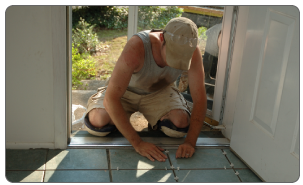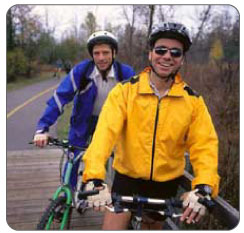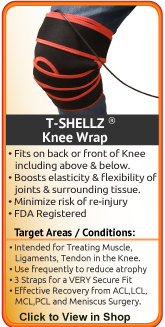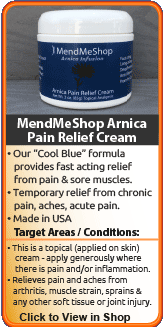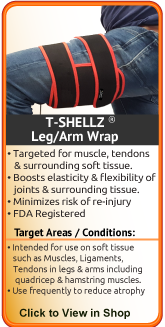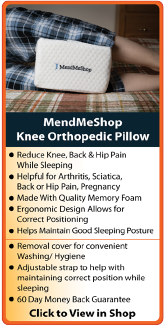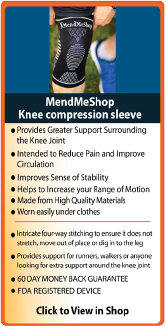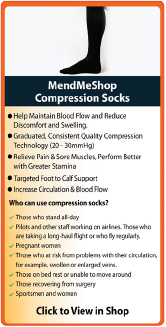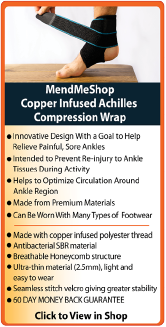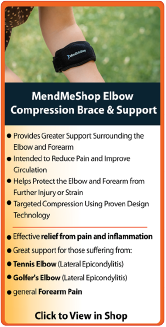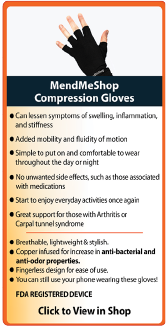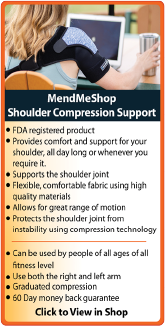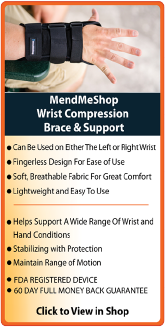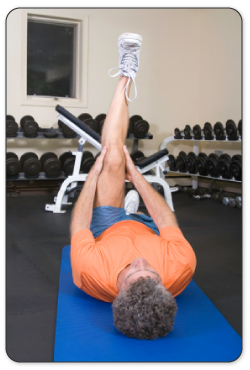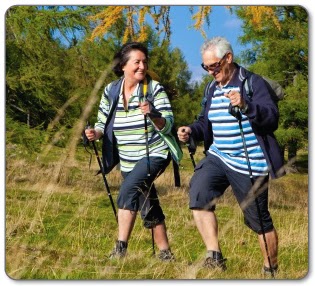Meniscus Tear Prevention
Treating meniscus injuries properly is important but preventing the injury in the first place and/or preventing re-injury should be your priority. There are a number of things you can do to keep your knees and menisci healthy and prevent further damage.
Maintain Strength and Flexibility in the Knee to Reduce Risk
To stabilize your knee joint and increase your range of motion, maintain and build the strength and flexibility of your quadriceps, hamstrings, calf muscles and hip flexors. Strengthening and stretching exercises will help to keep your knee strong and supple to reduce the risk of injury.
In addition, balancing exercises will help retrain your position or "joint sense". A regular exercise program that focuses on total body fitness and includes low-impact aerobic activity such as walking, swimming or biking will also strengthen your knee and keep you healthy overall.
Always Warm Up
Your body is less prone to injury during exercise when your heart, muscles and joints are gently warmed ahead of time. To protect your knees, warm up and cool down your leg muscles before and after working them, and learn the proper techniques for your activity. You can use the TShellz Wrap® to help warm up the area prior to an activity.
Use Proper Equipment
Invest in footwear that fits properly and is suitable for your activities or sports. Cushioning in the shoes will help to keep your knees stable during activity and reduce some of the impact. If your knee is weak or unstable, a knee brace, strapping or taping can provide extra support. When kneeling, wear knee pads to protect your joint from damage.
Avoid Activities That Cause Pain
If you are experiencing knee pain during any activity, stop and see a doctor to find out why. Listen to your body and decrease, modify and/or avoid any activities or motions that cause pain and irritation (twisting, squatting, kneeling, jumping, heavy lifting, climbing and running, walking on uneven terrain). If you are required to perform these motions at work or play and cannot avoid them, make sure you take frequent breaks and rest your knees to prevent fatigue.
Avoid Doing too Much too Soon
Following a knee injury, give your body an opportunity to build up its endurance. Progress through exercises gradually and work slowly when increasing the load or intensity. Allow your body adequate time to recover after exercise to repair any soft tissue damage that may have occurred. You can use a TShellz Wrap® for faster repair of the underlying tissue.
Meniscus Tear and Knee Pain Treatments
It is the blood in your body that heals and repairs damage to your tissue. By transporting oxygen and nutrients to the area and flushing away dead tissue, your blood helps your body to heal itself. Unfortunately, when a meniscus injury occurs and you have knee pain you need to prevent further injury and rest the area to allow it to heal. By resting, you actually limit the flow of blood and slow the healing process. The trick is to slow tissue damage, reduce scar tissue, and generate blood flow to speed healing and prevent further damage.
To learn more about how to get started using home conservative treatments for meniscus damage, click here to go to our meniscus treatments page.
To learn more about how to get started using home conservative treatments for meniscus damage, click here to go to our meniscus treatments page.
Our Torn Meniscus Formula
is Proven to Work!
If your doctor has decided that your meniscus tear can be treated using conservative treatments - well - it may seem hard to believe, but our Knee TShellz Wrap home therapy products will assist you in recovering from meniscus tears by maximizing blood flow where it's needed most and reducing your swelling and inflammation induced pain.
Here at AidMyMeniscus we pride ourselves in helping you with your healing and recovery process. Everyone at AidMyMeniscus has tested and used the products, finding solutions to conditions that do not fit into the norm. This dedication to our customers and our products goes hand-in-hand with our guarantees to you as a customer:
- Guarantee #1 - Use your products diligently for up to 60 days and you will experience a significant reduction in pain. If not, we encourage you to send back the items for a 100% refund.
- Guarantee #2 - You will not be left in the dark after purchasing any product form us. AidMyMeniscus Advisers and Product Specialists are available Mon - Fri by toll free phone 1.866.237.9608 or email to answer your questions or concerns.
- Guarantee #3 - Your order is guaranteed to be shipped within 24 hours on every business day.
- Guarantee #4 - All purchases receive a one year, full replacement warranty with guaranteed, prompt service.
- Guarantee #5 - You could save hundreds of dollars and possibly more, by utilizing our products, and getting back to work sooner.
Continue the healing process by resting your knee. Limit the activities that may be aggravate your knee. Without proper rest and limitation on activities, being active as if your knee is healthy can lead to re-injury. To get back to doing the things you love you need to give your body proper care and attention.
Prevention and Promotion of Lifelong Health
If you want to avoid re-injury, manage pain and increase circulation for lifelong health benefits, a Cold Compress or Ice Pack and a Knee TShellz Wrap® will provide the results you are looking for. Why spend time in pain, off from work, and missing out on your active lifestyle when you can be proactive about your injury and the health of your body? Talk to your doctor about incorporating a Knee TShellz Wrap® into your home recovery regimen.
AidMyMeniscus advisors do not work on commission, so be assured you will only receive fair and objective information.
Learn More About Meniscus Injuries & TreatmentsI want to learn more about Post-Surgery Recovery I want to learn all about Types, Patterns, Shapes & Severity of Meniscus Tears I want to learn more about TShellz Wrap® Circulatory Boost I want to learn more about Ice & Heat: Which Is Better For Treatment? I want to learn more about Meniscus Treatments I want to learn more about different types of Meniscus Surgery
FREE SHIPPING ON ALL PRODUCTS CURRENTLY ENABLED
During your recovery, you will probably have to modify and/or eliminate any activities that cause pain or discomfort at the location of your soft tissue injury until the pain and inflammation settle. The more diligent you are with your treatment and rehabilitation, the faster you will see successful results!
| 